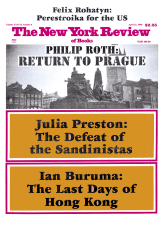In response to:
High Spirits from the February 15, 1990 issue
To the Editors:
Many thanks for sending me the February 15 issue of The New York Review of Books containing John Russell’s review of my book To the Memory of Childhood. I recognize what an honor it is to have a book reviewed in your journal. And what a kind, detailed, and expert review! Please give my regards and thanks to John Russell. I’m especially pleased with what he said about my father. We shall soon have the long-awaited Diary of Kornei Chukovsky (prepared for publication by my daughter) and an entire volume of his early critical work which hasn’t been reprinted for decades.
However, there were some errors in this otherwise wonderful article, which I would like to address. I understand that it is too late to correct them, but I think they should be pointed out.
1) The publication of my Entretiens avec Anna Akhmatova by the French publishing house Albin Michel was carried out in very bad faith. The structure and content of the French text do not correspond to the original. This edition should not have been used or publicized.
2) In the story “Going Under” the retreat house for writers is set not in Komarova, outside Leningrad (as the reviewer writes, for some reason), but in Maleevka, 120 kilometers outside Moscow. The natural surroundings are those of the Moscow outskirts: all the characters come from Moscow, go back to Moscow, exchange gossip and news about Moscow publishers, and so on. Komarova is simply a mistake.
3) My husband, the theoretical physicist M.P. Bronstein, was not arrested on August 6, 1937, and executed on February 18, 1938, because he had the same name as Trotsky. There are thousands of Bronsteins in the Soviet Union (among them the brother and father of my husband, who were not bothered by the authorities). Russell’s explanation is an uninformed attempt to find reasons for the arrest of people during the period known as “1937” (from Fall 1936 to Fall 1938). The human mind, unwilling to reconcile itself to the senseless, looks for reasons to explain every case. There was only one reason for the terror of 1937: quotas. The authorities set themselves the task of arresting a certain number of professors, teachers, dentists, chauffeurs, deaf and dumb people, workers, factory managers, officers, musicians, actors, film directors, shoe shiners and many others, and it didn’t matter whom they chose in each category. Those who were arrested were tortured until they admitted they were members of counterrevolutionary organizations and denounced others whose names were provided by the investigator. Afterwards they were either sent to a camp or shot. If they hadn’t confessed they would have met the same fate. Why? To what end? Ask the executioners, I don’t know what they’ll answer. I suppose those who have stayed free must be afraid to even breathe. But a person’s family name or even behavior played almost no role in his arrest.
That is all I can tell you, and once again with heartfelt thanks to you and the author of the excellent article.
Lydia Chukovskaya
Moscow, USSR
John Russell replies:
I alone am responsible for the two statements in my review to which Madam Chukovskaya refers.
On the dust jacket of the English translation of “Going Under,” which was published in the United States by Quadrangle/The New York Times Book Company in 1974, the action is said to take place in “a rest home in the Russian part of Finland.”
Komarovo is very close to the Finnish border. On the first page of the book the author refers twice to a group of “little Finnish houses” that stood no more than a minute’s drive from the rest home in question.
This being so, I saw no reason to disbelieve it when I was told in Leningrad, on returning last fall from a visit to Komarovo, that Lydia Chukovskaya had once stayed there in a rest home for writers.
It was also in Leningrad that I was told that (I quote) “apparently” Matvei Bronstein had been arrested in 1937 for the reason I mentioned. The word “apparently” was intended to imply that this was a current supposition that might or might not be true but was, in any case, an indication of the irrational and mindless manner in which arrests were made at that time.
I hope it is clear from the rest of my review that the very last thing that I would have wished to do was to cause pain or annoyance to Madame Chukovskya.
This Issue
April 12, 1990



